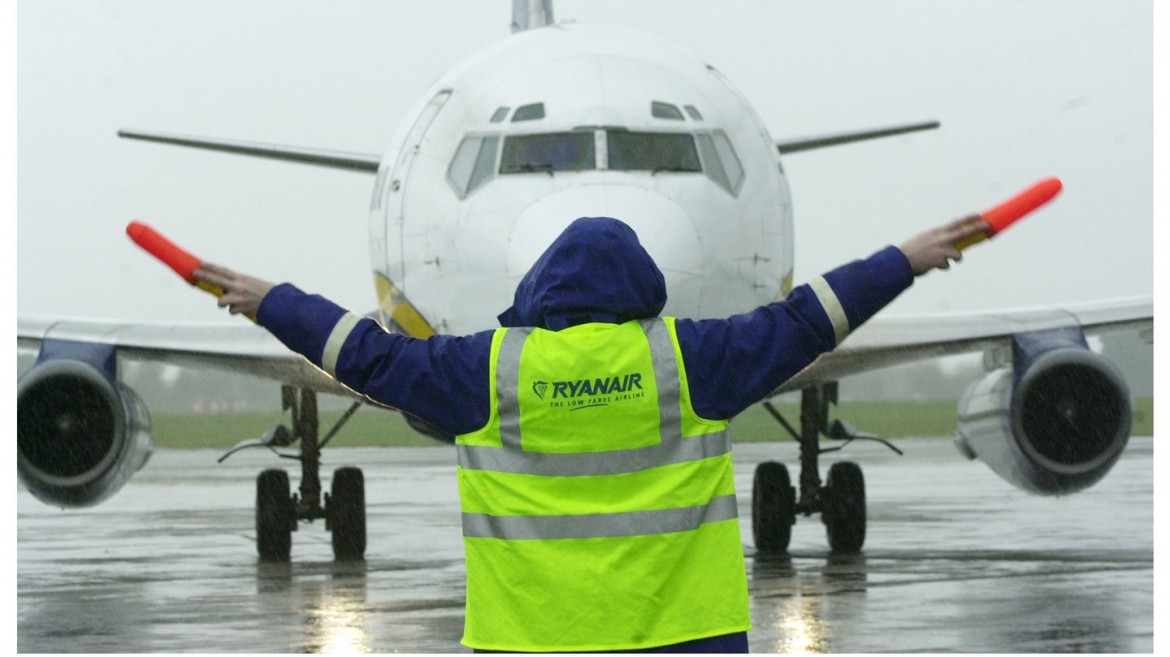Interview
Second Ryanair strike today may move the ‘brick wall’
We spoke with Emiliano Fiorentino, national secretary of the Italian transport labor union FIT CISL. “We are not against multinational corporations; we simply want Ryanair to make working for them more dignified.”

It is a known fact that “CISL” and “strike” are almost never used in the same sentence. But FIT CISL, the Italian union of transport workers, was the first to proclaim a strike against Ryanair, through its national secretary, Emiliano Fiorentino.
“Our dispute has been ongoing since 2006. In the meantime, Ryanair has become a giant in Italy, but for us they have always been a brick wall. We have planned three strikes during this time, and this will be the second that goes into effect [the first was Nov. 7, 2016] without any worker openly supporting it, due to the fear of being fired. On Friday, we expect things to end differently: The simple fact of making public the threats received from the company is the signal that something is changing.”
Fiorentino, you at CISL seem to be hardliners against Ryanair. Is it a given that all the union leaders are in agreement on this?
For us, a strike is always the last resort, and we are always for mediation and discussion. But with Ryanair we were always talking to a brick wall: The company has not been acknowledging us at all for 10 years, and a strike has become an unavoidable action.
This time, the independent ANPAC union has joined your strike as well, with a strong presence among pilots, who have better protections than flight crew. And the company responded with a very harshly worded email, which was made public by the workers, leading to an unexpected surge of solidarity in the media. That is already a good result.
Yes, as it’s possible that such an email was also sent on previous occasions. But things are changing. The company’s blackmail is so blatant, and involves elements that are of such great importance for the workers — the system of programming shifts, and therefore the stability of people’s lives — that this time, the pilots have rebelled.
You are the strongest among flight crew. But in the previous strike, none of them stopped working after all. Do you expect things to end differently on Friday?
After the recent episode with the canceled flights, discontent among workers has gotten much worse. Only a few months ago they were still afraid to contact us, but now hundreds of them are union members, and not only of FIT CISL. Due to the fear of reprisals against them, we haven’t yet informed the company of who we are representing, but we expect that some will go on strike on Friday. During those four hours — from 1 p.m. to 5 p.m. — something will happen. The strike is, in any case, a step on the pathway to the recognition of our union by Ryanair, which is our real goal.
Ryanair has never been willing to acknowledge you so far, but did you manage at least to meet with one of their representatives?
We sent them many requests for a meeting during these 10 years. We began in 2007, denouncing their failure to pay social security contributions, and then we followed up regarding the rules governing the compensation of flight personnel. We never got an answer, and we have never met with a representative of theirs. For this strike, we followed established procedure [the strike was initially scheduled for Oct. 17] and we asked the ENAC [National Civil Aviation Authority] to decide together with Ryanair which of their flights would be among the minimum guaranteed by law during the strike. Ryanair didn’t respond, and they didn’t show up at the ENAC either.
The government promised to help you. In September, Minister Delrio summoned Ryanair to a meeting at the Ministry of Transport. Has he been successful?
In the two months since those statements, we have not received any kind of update or summons from the government. We know that Ryanair first responded to the government that they don’t recognize the unions, but we expected that the government would summon them again. They went to the ENAC to answer for the problems caused by their cancellations, but they weren’t asked anything regarding the conditions of their workers and the way in which they respect contracts.
On Wednesday, several ministers — Calenda, Orlando, Poletti — attacked Ryanair.
We hope they will actually do something to help us achieve normal labor relations, like with all other airlines, including low cost ones.
Looking at the recent events with Amazon, the impression is that the system of multinational corporations is showing signs of breaking down. They are no longer able to ignore you, the unions, and the poor conditions which they force on their workers.
Yes, fortunately, the system is indeed showing signs of breaking down, and the strikes in Ireland and Germany confirm it. We are not against multinational corporations; we simply want Ryanair to make working for them more dignified, while respecting the current Italian norms. Not the Irish ones.
And you, like FILT CGIL, are also fighting them in the courts in parallel.
Yes, we have several lawsuits pending: one for dismissal, some for anti-union behavior and others for them not recognizing the so-called transnational posting of workers directive, the European directive which states that airlines must comply with the regulations of the country in which they operate. The first rulings should be passed in early 2018.
Originally published at https://ilmanifesto.it/lazienda-e-sempre-un-muro-ma-stavolta-qualcosa-si-muove/ on 2017-12-14
